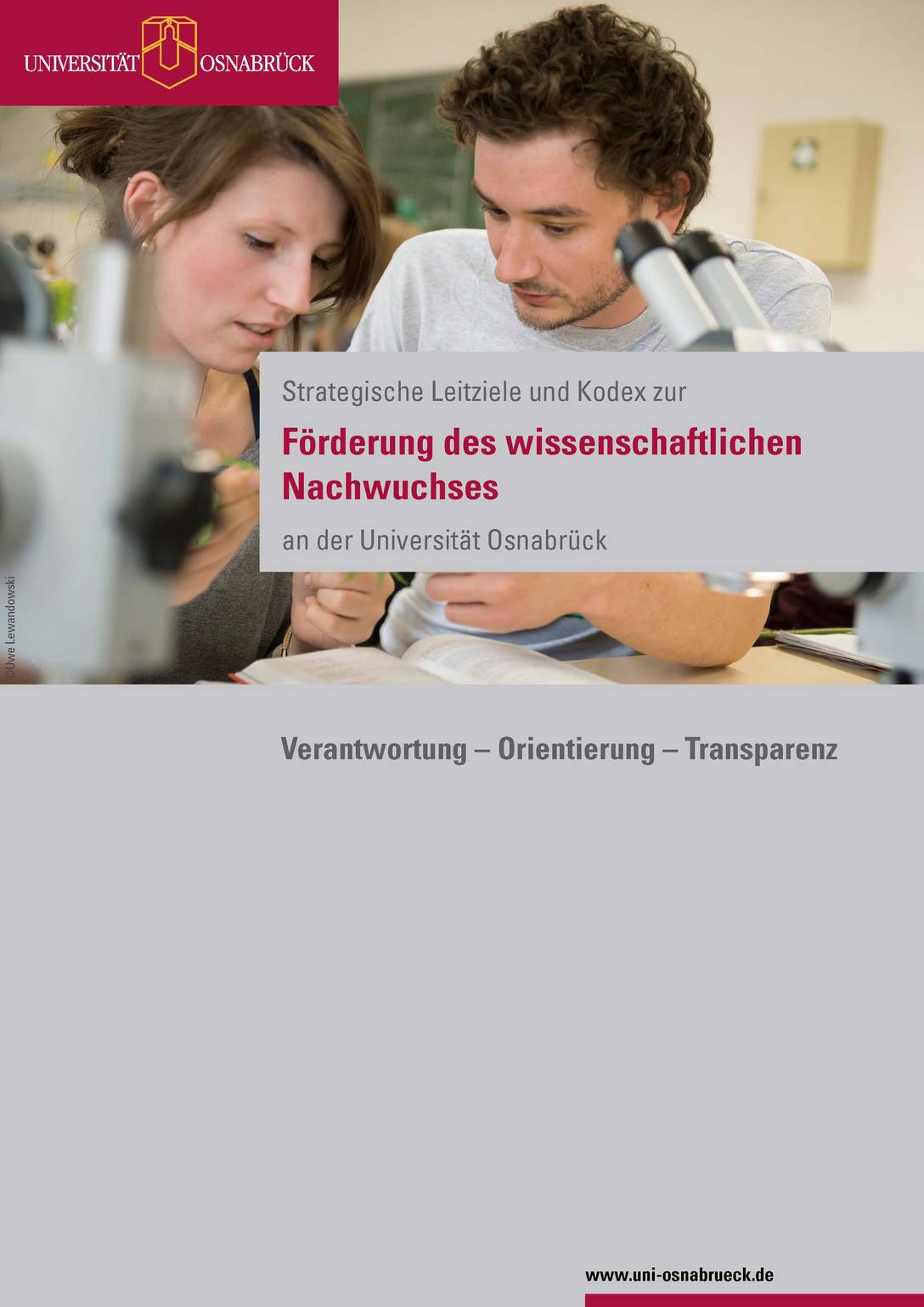Main content
Top content
Development of early career researchers
Osnabrück University attaches great importance to supporting early career researchers. The University is committed to a systematic promotion of early career researchers by offering structured programs in addition to providing individual support and training for certain target groups. The key aspects of supporting early career researchers include:
Key strategic objectives and code for the promotion of early career researchers
As part of the university-wide strategy process, the Senate of Osnabrück University adopted the personnel development concept for academic staff at the university on October 21, 2018. The university has thus set itself three key strategic goals for the promotion of early career researchers: (1) strengthening responsibility for early career researchers at all levels (2) as well as the orientation of early career researchers with regard to their career options and (3) increasing transparency with regard to all aspects of the academic qualification phases. In order to achieve these key objectives, the University agreed on a common, binding basic understanding of the promotion of early career researchers with the Code of Conduct for the Promotion of Early Career Researchers at Osnabrück University.
PhD programs and research training groups
PhD students at Osnabrück University can decide whether to follow a structured PhD program or to work towards a PhD in the traditional manner. Osnabrück University offers three PhD programs that accept new students each year. Students can also gain a PhD by joining a research training group. In this case, candidates may be awarded a scholarship or a position to participate in a structured, interdisciplinary program. Scholarships and positions are advertised within the University and beyond the region, depending on the graduate program’s funding cycle.
The PhD/Postdoc Career Center
As an umbrella organization, the PhD/ Postdoc Career Center supports doctoral candidates and postdocs as well as junior professors from all disciplines in their academic and interdisciplinary further qualification. The PhD/ Postdoc Career Center offers interdisciplinary seminars to strengthen key academic and career-related skills as well as support for career orientation. With regard to their career planning, early career researchers are offered support in shaping their academic or non-academic career paths. The aim is to prepare doctoral and postdoctoral researchers for successfully taking on management responsibilities in science and industry. Junior professors are supported with advice, coaching and workshops to help them take on leadership and management roles.
Mentoring programs for Early Career Researchers
The mentoring programs organized by the PhD/Postdoc Career Center are part of the targeted and process-oriented continuing education programs for scientists in qualification phases at Osnabrück University. With this instrument, the university provides qualified female doctoral candidates and all postdocs with ideal support regarding their professional orientation and career planning. Two programs, one for female doctoral candidates and one for all postdocs, are offered alternately.
The programs, each lasting 12 months, combine an individual mentoring relationship between mentee and mentor with a demand-oriented qualification program in which the idea of networking plays an important role. In addition to the personal development and professional profiling of the mentees, the central goals of the programs are to increase the proportion of women and first-time academics in scientific leadership positions and to strengthen equal opportunities within the science system.
Research consultants
The research consultants at Osnabrück University provide scholars from all Schools across the University with advice on how to fund their research. They support postdocs for example in applying for funds for their own position or project. They also explain how subsidies to finance conferences can be acquired an doffer information events about third party funding programs. The President’s Cabinet of Osnabrück University has set up a central research support pool to support the promotion of research-related third-party funding acquisitions. Female PhD students at Osnabrück University who are in the final stage of their PhD studies can apply for a completion grant from the female promotion pool. In addition, highly talented female early career researchers in the final stage of completing their habilitation (post-doctoral degree) project may apply for funding. Activities and projects that help achieve equal opportunities for men and women at Osnabrück University are also eligible for funding.
Training in higher education didactics
In cooperation with the University of Bremen, the University of Oldenburg and Technische Universität Braunschweig, Osnabrück University offers university staff a modularized course leading to the certificate “Qualification in Higher Education Didactics”. This qualification is recognized throughout Germany. The program is open to all academics involved in teaching at the University. Not only does participation in this course help raise the quality of teaching at Osnabrück University, but it is also crucial evidence of possessing skills and competencies in higher education didactics when applying for teaching positions. The program meets the standards of advanced training in higher education didactics of other federal states, as well as international standards. Such skills are known to play a role when it comes to appointing higher education teaching staff.





